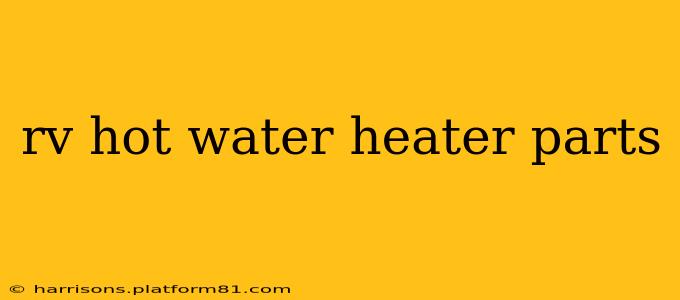Replacing or repairing your RV's hot water heater can seem daunting, but understanding the individual parts makes the process much more manageable. This guide breaks down the essential components of an RV hot water heater, explaining their function and common issues. Whether you're a seasoned RVer or a first-timer, this detailed overview will empower you to troubleshoot problems and maintain your hot water system effectively.
What are the Main Components of an RV Hot Water Heater?
RV hot water heaters, while smaller than their residential counterparts, share many of the same fundamental parts. Understanding these components is crucial for successful maintenance and repairs. The key parts include:
-
Tank: This is the primary container holding the water. Most RV hot water heaters are constructed from either steel or plastic. Steel tanks are more durable but prone to corrosion; plastic tanks are lighter but can be more susceptible to damage from impacts.
-
Heating Element(s): These electric elements heat the water within the tank. Most RV water heaters have one or two heating elements, allowing for different heating speeds and energy efficiency. A common issue is a burnt-out heating element, often indicated by a lack of hot water.
-
Thermostat: This crucial part regulates the water temperature, ensuring it doesn't get too hot and preventing damage to the heating element or tank. A faulty thermostat can lead to inconsistent hot water temperatures or complete failure to heat the water.
-
Anode Rod: This sacrificial rod protects the tank's interior from corrosion. It attracts minerals and sediment from the water, effectively extending the lifespan of the tank. Regular inspection and replacement (every 1-3 years, depending on water quality) is highly recommended.
-
Pressure Relief Valve: This safety device prevents excessive pressure buildup within the tank, which could lead to a potentially dangerous explosion. It's essential to periodically check and test the pressure relief valve to ensure it functions correctly.
-
Water Inlet and Outlet Valves: These valves control the flow of water into and out of the hot water heater. Problems with these valves can lead to leaks or prevent the water heater from filling properly.
-
Gas Burner and Components (for Gas Water Heaters): Gas-powered RV hot water heaters utilize a gas burner assembly, which includes the burner, igniter, thermocouple, and gas control valve. Malfunctions in any of these parts can prevent the water heater from igniting or maintaining a consistent flame.
How Do I Troubleshoot My RV Hot Water Heater?
Troubleshooting your RV's hot water heater often begins with identifying the symptoms. Let's address some common issues:
My RV Hot Water Heater Isn't Heating:
This problem could stem from several sources:
- Burnt-out heating element (electric): Requires replacement.
- Faulty thermostat: Needs testing and potential replacement.
- Low propane (gas): Check propane levels and ensure the tank is connected properly.
- Faulty igniter or thermocouple (gas): These components need inspection and may need replacing.
- No power supply (electric): Verify power connection to the water heater.
- Bad gas valve (gas): Check for gas flow and valve operation.
My RV Hot Water Heater Is Leaking:
Leaks can be caused by various factors:
- Faulty valves: Check all valves for leaks and replace as needed.
- Cracked tank: This often requires a complete water heater replacement.
- Loose or damaged fittings: Tighten loose fittings; replace damaged ones.
- Pressure relief valve failure: Test and potentially replace the pressure relief valve.
My RV Hot Water Heater Is Making Noise:
Unusual noises often indicate sediment buildup or other issues:
- Sediment buildup: Regular flushing of the tank can help.
- Loose parts: Check and tighten loose components.
- Expansion and contraction: This is normal to a certain extent but excessive noises might point to a larger problem.
How Often Should I Replace My RV Hot Water Heater Parts?
The lifespan of your RV hot water heater parts varies based on usage and water quality. However, here are some general guidelines:
- Anode Rod: Every 1-3 years.
- Heating Element: As needed, depending on usage and signs of failure.
- Thermostat: As needed, depending on functionality.
- Pressure Relief Valve: Every few years, or if malfunction is suspected.
Regular maintenance, including flushing the tank and inspecting parts, significantly extends the lifespan of your RV's hot water heater and helps prevent costly repairs.
This comprehensive guide offers a solid foundation for understanding your RV hot water heater's components and troubleshooting common problems. Remember, if you're unsure about any repair, consult a qualified RV technician. Keeping your hot water system in good working order ensures comfortable and enjoyable RV adventures.
